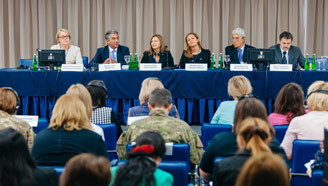The role of women in the Ukraine military conflict
Amid the fighting in eastern Ukraine, high levels of gender-based violence continue to be reported in the conflict area, including sexual violence. Moreover, women in Ukraine are often excluded at a decision-making level, as well as from the military response to the crisis.

Increasing awareness
To address these issues, the NATO Science for Peace and Security (SPS) Programme supported a workshop in Kyiv from 21 to 22 September, which brought together high-level officials, leading experts and voices from Ukraine and the international community. Participants analysed specific participation and protection gaps women and girls face in Ukraine in the ongoing crisis. The workshop served to create awareness of United Nations Security Council Resolution (UNSCR) 1325 on Women, Peace and Security, and explored opportunities to increase the participation of women. In this vein, the gaps in national legislation on the issue of equal participation of women in conflict resolution and peace-building processes was also brought to the table.
The event was led by project directors from the Istituto Affari Internazionali (IAI) of Italy, and the Democracy Development Centre (DDC) of Ukraine. “We know the huge economic problems and security challenges that this country is facing, and we can understand how difficult it might be in these circumstances to move towards the implementation of a 1325 National Action Plan and on women’s full participation in the promotion of peace and security. But, notwithstanding the present time of crisis, UNSCR 1325 represents an element of civilisation, social improvement and policy normalisation for all countries – and this is the importance of today’s workshop,” said Gianni Bonvicini, Executive Vice President of IAI.

More than 110 participants attended the workshop, including representatives from the Ukrainian Government, members of the Ukrainian Armed Forces and civil society, as well as international experts on gender mainstreaming. “The role of civil society in the implementation of UNSCR 1325 is vital. Civil society has been heavily involved in the evaluation and development of many Allied and partner National Action Plans, and continues to show its commitment and leadership in the Women, Peace and Security domain,” said Michael Gaul, Senior Advisor on Projects and Strategy in NATO’s Emerging Security Challenges Division.
Enhanced participation
Ms Iryna Lutsenko, People's Deputy of Ukraine, shared the experience of female parliamentarians working personally on the frontline, where they provided assistance to volunteers and hospitals, and mobilised the community by raising funds in support of internally displaced people, most of whom are women and children. “We [women] are only the 12% of the Parliament and we could do so much for our soldiers and volunteers, and for the population living on the frontline. Imagine how much more could be done if we only were the 30%. Women are not passive. Women can, want and do,” she stated.
The important role women play in the armed forces, mostly on a voluntary basis, was widely discussed. Stereotypes, insufficient institutionalisation, lack of adequate salaries and social support, together with limited rehabilitation programmes, were among the issues brought to light. These issues represent some of the biggest challenges that Ukraine faces in its forthcoming approval and implementation of the 1325 National Action Plan.
“We are making a great effort in order to bring the gender perspective in all issues we work on and have it on our agenda. We aim at having it as one of the top five priorities of our society in this hard time. I’m grateful to IAI and DDC for organising this workshop with the support of NATO. This event will bring an impetus to our work,” said Serhiy Ustymenko, First Deputy Minister on issues of European Integration at the Ministry of Social Policy of Ukraine.
Women continue to have an active role in the military conflict in Ukraine. Though much work remains to be done, beginning a dialogue and open exchange about the many barriers facing woman in Ukraine today marks an integral first step towards finding a resolution of these challenges.
